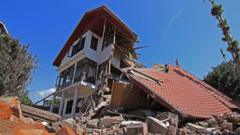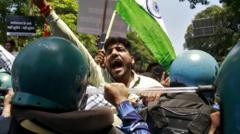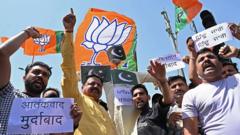Following a devastating terrorist attack in Kashmir that claimed the lives of 26 people, India has reiterated accusations against Pakistan for its alleged support of terrorism. The harmless-looking conflict has escalated tensions as questions about national security and military responses arise.
Kashmir Turmoil: India’s Accusations Against Pakistan Intensify

Kashmir Turmoil: India’s Accusations Against Pakistan Intensify
India claims Pakistan's involvement in Kashmir terror attack as tensions rise over the region.
In the wake of a tragic incident in Indian-administered Kashmir where 26 individuals, primarily tourists, lost their lives, the Indian government promptly branded the event a terrorist attack, pointing fingers at Pakistan for its purported involvement. A group identifying itself as the Resistance Front took responsibility for the attack on social media, while Indian officials suspect this group serves as a proxy for the notorious terrorist organization, Lashkar-e-Taiba, which is based in Pakistan.
While Indian authorities have indicated links between the attack and Pakistan, they have offered limited public evidence to substantiate their claims. On the other side, Pakistan has denied these accusations and printed a strong assertion that claims about Lashkar-e-Taiba's operational capabilities are exaggerated. Furthermore, Pakistan has called for an international investigation to delve into the circumstances surrounding the attack.
As these tensions unfolded, Indian officials hinted at the possibility of a military response against Pakistan, citing a long history of militant groups reportedly supported by the neighboring country and a perceived pattern of hostility towards India. The Kashmir conflict has historic roots dating back to the 1947 partition of British India, a development that established vastly different national identities for both nations—India largely Hindu and Pakistan predominantly Muslim.
In such a high-stakes geopolitical environment, the implications of this recent incident could usher in further confrontational strategies, shaking the delicate balance of peace in the region once again. As the situation continues to evolve, questions linger as to the broader impact on international relations and regional stability.





















